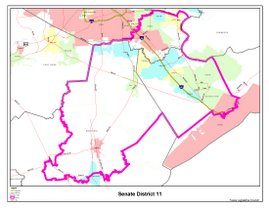Merry Christmas!
"Glory to God in the highest, and on earth peace, good will toward men." Luke 2:14
Eliza and I wish you all a Merry Christmas and Happy New Year! We thank you again for the opportunity to represent you in Austin. It's a wonderful time in House District 129. We are lucky to be filled with such vibrant and eager citizens who thrive to better our community daily. As we embark on the new year, I promise to keep you informed on the issues facing Texas in 2018. |
 | Texas House Republicans Secured Election Integrity -
In 2011, the Legislature passed Senate Bill 14 to require stricter collection of voter identification during elections. Forms of appropriate identification included a state driver's license or ID card that is not more than 60 days expired at the time of voting, a concealed handgun license, a U.S. passport, a military ID card or a U.S citizenship certificate with a photo. -
Later that year, the state was sued on the grounds that Senate Bill 14 was discriminatory under the Voting Rights Act. In August 2015, the U.S. 5th Circuit Court ruled that the law was not considered a "poll tax." Although the state legislature did not have discriminatory intent when passing the law, the court perceived a "discriminatory effect" did occur that violated the federal law that prohibits racial discrimination in voting. -
Towards the end of the 85th Regular Session, Governor Greg Abbott made amending the state's voter identification law an emergency item for the Legislature to address. -
Increasing concerns and a number of recent cases and investigations related to mail-in ballot issues in local races lead the state to take a closer look at irregularities within the system of mailing in a ballot. -
Texas is one of nine states that still allows the practice of casting a straight-ticket vote at the polls (this will change following September 2020 when HB 25 goes into effect). The practice of straight-party voting has become a less common occurrence since the 1960s. Legislation from the 85th Sessions Senate Bill 5 (85R) - Voter ID Law
-
Requires the Secretary of State to establish a program using mobile units to provide election identification certificates to voters in order to satisfy voter ID requirements -
Allows for voters who are not able to meet the photo identification requirement, to meet the requirements by: Showing one of the approved forms of non-photo ID. Executing a declaration stating the voter has a reasonable impediment to meeting the requirement
Senate Bill 5 (85(1)) - Mail-in Ballot Fraud -
Eliminates electronic signatures on applications for mail in ballots. Electronic and faxed applications must now be followed up by the original application with the original "wet" signature. Aligns with voter registration requirements. -
Enables and requires signature verification and ballot board committees to reject fraudulent ballots. Currently, these boards may not reject a ballot, they may only confirm the signatures are, or are not, a match. Also grants them authority to deny if the signatures on the application and carrier envelope are not those of the voter, and/or do not match. Adds liability to ballot board members who knowingly accept invalid signatures. * Creates a new definition of "voter fraud", establishes a "voter fraud" offense (Class A Misdemeanor), and gives law enforcement the tools they need to go after violators.
House Bill 25 - Eliminates straight-party voting in Texas. Encourages voters to consider more carefully candidates running in elections by requiring they vote for each individual race.
Aftermath: -
In August 2015, a U.S. District Judge ruled that the new voter identification law failed to properly accommodate minority voters. However, the 5thCircuit Court of Appeals blocked this ruling and will allow the state to use the revised law for the next round of elections in November 2018. In early December, the 5th Circuit Court heard arguments on whether the law will have a discriminatory effect, although it is not clear when a ruling will occur. -
The new law cracking down on mail-in ballot fraud went into effect on December 1st and will be in place for the March 2018 primary elections. -
House Bill 25 will not impact elections until after September 2020. Social Media Posts The voting process in Texas demands the highest level of accountability. By eliminating the option of straight-ticket voting, we are upholding the integrity of our elections and placing responsibility back into the capable hands of our voters. Texans and all Americans are accustomed to presenting valid identification in many places to gain access - in airports, hotels, offices, government buildings, etc. The voting process is no less important than any of these and should have the same safeguards to ensure a fair outcome in every election. Texas House Republicans took necessary steps to protect Texas voters' fundamental right to vote by cracking down on those who knowinglyand intentionally deceive, mislead, or misinform voters that use mail-in ballots.
|
 |  Capitol Visitor Information Capitol Visitor Information
My staff and I welcome everyone to visit our office as well as the historic Capitol building. If you are planning a trip to the Capitol be sure to stop by our office, Room E2.814. Here are some helpful tips for your visit:
|
| | 

Stay Connected |
| | |

No comments:
Post a Comment